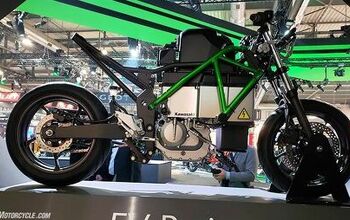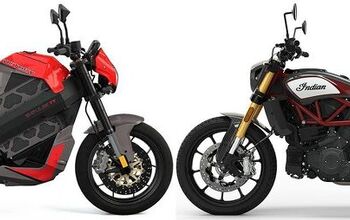How Much Is An Electric Motorcycle?

The price of riding without gas
Electric motorcycles may be the future, but right now they are far from being price-competitive with their gasoline-powered cousins. But don’t worry! Even though having an electric motorcycle can cost you many thousands of more dollars, you may be able to even out the price difference.
How Much?
Electric motorcycles – practical ones with enough range to be practical commuters – haven’t been around too long, so you’ll likely have to buy new. Street-legal electric motorcycles start at $8,495 for the Zero FX or FXS and can go up to $46,888 for the highest-spec, 218-mph Lightning LS-218 (the fastest production motorcycle in the world, by the way). If what you need is a simple, lightweight commuter for a 20-40 mile round trip to work each day, Zero’s model S with a 7.2-kw-hour battery pack will likely do the trick, with a $10,995 MSRP.
Actual Cost
But what if you compared actual operating cost over the life of the bike? Let’s assume you can ride your motorcycle to work 200 days a year, and like most Americans, you commute about 30 miles round trip and have a place to plug your motorcycle in at night. Also, like most motorcyclists, you have more than one motorcycle, so you’ll have a long-distance steed when you need to go further than the 60-mile combined highway/city range of the Zero S 7.2.
Let’s also compare it to a new Suzuki SV650, a fun and economical gas-powered ride. It makes about 60 horsepower – a lot more than the Zero’s 34 – but the Zero makes 78 foot-pounds of torque, far more than the Suzuki and the kind of power you need to zip effortlessly through your morning commute. The SV is just $6,999, but that’s not the end of your expenses! We have to also compare the price of fuel and maintenance. We’ll assume insurance, tires and other costs are about equal.
In eight years, you’ll travel about 48,000 miles. We’ll also assume gas will stay around $3 a gallon for that entire time, which is being kind to the gas-powered bike, as we’ve seen the price of gas soar past $5 in the last decade. Also, in 48,000 miles, the Suzuki will need 10 or 11 oil changes, as well as a few coolant changes, valve inspections/adjustments, two or three sets of chains and sprockets (depending on how good you are at maintaining them), air filters, fuel-injection syncs and other services and parts the Zero won’t need. Zero’s service schedule is much simpler – it’s basically inspections every 4,000 miles – and therefore cheaper. Even if you do the work yourself (ew!), the price of parts alone will be far more for the Suzuki.
Based on all these factors, over eight years, that gas-powered Suzuki will cost you around $14,599, while the Zero will ring up about $13,664. Of course, the Suzuki has better range, top speed and versatility, but it’s also almost 100 pounds heavier than the Zero and can’t match the silent, smooth operation of the electric bike. Of course, like me, you may love the sounds and feels of a snarling V-Twin. It’s all about individual preference, but the overall costs of electric motorcycling need not be more than burning gas.

Motorcycle.com presents an unrivaled combination of bike reviews and news written by industry experts
More by Motorcycle.com Staff





























Comments
Join the conversation
ELECTRICITY is for COMMUNISTS. Like socialized healthcare and PUBLIC SCHOOLS and ATHIESM. Give me my V-TWIN back please
We haven't won EVERY war just to sell out to the COMMIES now
Electric bikes are soulless extravagances for enviro-jihadis. The vanity factor is more important. However, powered by tertiary energy, electric vehicles (if their power source is fossil-fueled) are much less efficient than gas. Also, the manufacturing process employs many more toxic chemicals and much more energy. If you're green, electric is a very poor choice.